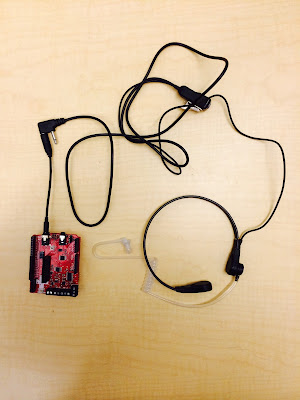 |
| This is a prototype of the AutoDietary food-tracking system |
Nowadays, it’s not uncommon for people to measure their days in steps taken.
“Many wearables, such as Fitbit, Garmin fitband, flow out into the market. However, they only measure energy expenditure,” Prof. Wenyao Xu, of the Univ. at Buffalo, told R&D Magazine. “There is no device which could measure energy-intake.”
Working with researchers at China’s Northeastern Univ., Xu has developed a new wearable device that is capable of monitoring what you eat based on the distinct sounds food make when chewed. Called AutoDietary, the device comes in the form of a necklace, and was the subject of a study published in February by IEEE Sensors Journal.
The device’s operation is dependent on the compilation of a library of chewed food sounds. According to the researchers, each food, when chewed, emits a distinct sound.
“In the paper, we tested it with seven different types of food. We have 12 now, and it is a growing test,” said Xu.
The 12 participants in the experiment tested the device while chewing foods, such as apples, carrots, potato chips, cookies, and peanuts, among a few other items. AutoDietary boasted an average classification accuracy of around 85 percent.
That 85 percent “can still provide a decent estimation of caloric intake. We are improving the system accuracy now,” Xu said.
According to the Univ. at Buffalo, the device wraps around the back of the neck and a microphone the size of a zipper records the sounds. Via Bluetooth, the sound is sent to a Smartphone, where food classification occurs.
Xu hopes the technology will be available to the public by the end of 2016 or the start of 2017.
In the interim, some kinks still need addressing. For instance, the device cannot detect the ingredients in a bowl of soup or chili, according to the Univ. at Buffalo. Additionally, Xu and colleagues want to find a way to optimize the device’s battery life. “We have an algorithm to detect if the user is eating, and then intelligently turn on/off the sensor,” Xu said.
For the former issue with food differentiation, the team thinks a biomonitoring device, such as a watch, could help. The watch would monitor the food’s nutritional value via blood sugar levels, among other measurements.
Soon, calorie counters may have a device that does the math for them.
Source: http://www.rdmag.com/




No comments:
Post a Comment